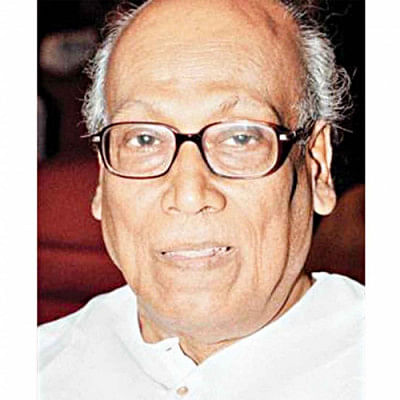Poet Shankha Ghosh passes away

Shankha Ghosh, the last of the five cult figures of modern Bangla poetry post Jibananda Das, died at his Kolkata residence after losing a week-long fight against Covid-19, bringing an end to a golden phase of Bangla literature.
He was 89
Ghosh, along with his contemporaries like Shakti Chattopadhaya, Sunil Gangopadhyay, Utpal Kumar Basu and Benoy Majumdar, had formed what came to be known as the "pancha Pandav" of Bangla poetry in the post-Jibananda era.
But Ghosh clearly towered over the rest with the nuances of his poetic diction and by his brilliant academic record as a literary critic and researcher. No wonder, he was equally respected both in Bangladesh and West Bengal, once again driving home that culture knows no border.
Suave in nature and low-profile, Ghosh was always firm in his ideological conviction and he passionately clung on to his values and beliefs. That is why even in his advanced age with a frail health, he could never shy away from taking to the street and wielded his pen by writing a poem protesting against intolerance, authoritarianism and for the Citizenship Amendment Act (CAA), which seeks to give Indian citizenship to religious minorities from Bangladesh, Afghanistan and Pakistan, who came to India after facing "religious persecution."
He showed this trait in his character from as far back as the 1950s with the poem "Yamunavati", inspired by the killing of a girl during the movement against food price hike in Kolkata.
Ghosh's ideological convictions did not stop him from opposing the Left Front government in West Bengal after the police firing during the agitation by farmers against land acquisition for the industrialisation in Nandigram in 2007, an event that paved the way for Mamata Banerjee's rise to chief ministership. He did not spare Mamata Banerjee-led ruling Trinamool Congress either, particularly during the widespread violence and intimidation by the party in the 2018 panchayat polls in the state.
Ghosh tested positive for Covid-19 on April 14 but did not want to be taken to hospital. His condition worsened on Tuesday night and he was put on ventilator support yesterday morning before he breathed his last at around 11:30am.
Ghosh left behind two daughters Semanti Ghosh and Srabanti Bhowmik, and was predeceased by his wife sometime back.
Born on February 5, 1932, as Chittopriyo Ghosh in Chandpur in what is now Bangladesh, the poet, however, belongs to Banaripara in Barisal.
He spent his formative years in Pabna, where he did his matriculation from Chandraprabha Bidyapeeth in 1947. He completed his BA from the prestigious Presidency College in 1951 and obtained his Master's degree from Calcutta University.
Son of a headmaster and Bangla grammarian Manindrakumar Ghosh, Shankha Ghosh spent several years in teaching in Bangabashi College and City College in Kolkata, Delhi University, University of Iowa, USA, and Visva Bharati, while also doing research in the Indian Institute of Advanced Studies in Shimla. He retired as a teacher in Jadavpur University in Kolkata in 1992.
A recipient of the Sahitya Akademi award in 1977 for his eponymous book of poems "Babarer Prarthana" (1976), Ghosh was honoured with a second Sahitya Akademi award 22 years later for his translation of a Kannada language play in Bangla. He also won the Jnanpith award in 2016, Desikottama from Visva Bharati in 1997, Rabindra Puraskar and Saraswati Samman and several other prizes -- all these for a man who hardly cared about awards.
It was in keeping with his dislike for the loud that Ghosh never wanted the customary 21-gun salute to accompany his final journey. He was given a state funeral sans the booming guns.
In 2011, he was conferred the Indian government's third highest civilian honour -- the Padma Bhushan.
He had written and edited several books.
Among his notable works are "Dinguli Raatguli", "Dhum Legeche Hritkomole" (1987) "Mukh Dheke Jaai Biggapone" and "Gaandharba Kobitaguchcha" (1994), Chander Bhitorey Eto Andhakar (1999) and "Jal-I Pashan Hoey Aache" (2004) -- all of which brings out the anger, anguish and sarcasm of Ghosh about the developments around him at the prevailing time.
If Ghosh's main domain was poetry, he was equally facile with his prose and he had particularly carved a niche for himself as an expert on Rabindranath Tagore. He was also the director of Rabindra Bhavan from 1989 to 1990.
Ghosh's poems have focused on the unfathomable depths of human sensibilities, putting the stamp of his inimitable personal style and conviction while giving voice to the people of his time,-- a voice that transcended the confines of time and space. His creativity as a poet found ample reflection in his literary criticism, particularly in his interpretations of Tagore's work.
Condoling the death of Shankha Ghosh, Indian Prime Minister Narendra Modi said Ghosh "will be remembered for his contributions to Bengali and Indian literature. His works were widely read and admired. [I am] saddened by his demise. [I offer] condolences to his family and friends."

 For all latest news, follow The Daily Star's Google News channel.
For all latest news, follow The Daily Star's Google News channel. 



Comments